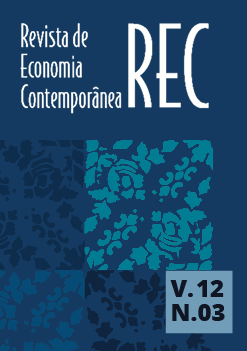TAXA DE JUROS: COMPORTAMENTO, DETERMINAÇÃO E IMPLICAÇÕES PARA A ECONOMIA BRASILEIRA [INTEREST RATE: ITS BEHAVIOR, DETERMINATION, AND IMPLICATIONS FOR THE BRAZILIAN ECONOMY]
Palavras-chave:
taxa de juros, setor externo, dívida públicaResumo
Resumo: O objetivo principal deste trabalho é analisar o comportamento e os fatores determinantes da taxa de juros e seus efeitos sobre a condução da política macroeconômica no Brasil desde julho de 1994. Assim, tenta responder às seguintes questões: Por que as taxas reais de juros são altas? Quais são as forças que realmente as determinam? Quais são as implicações para a economia, se essas permanecerem altas? O que pode ser feito para reduzir os seus níveis atuais? Os resultados obtidos mostraram que as causas principais das altas taxas de juros se encontram no âmbito de reduzir e controlar a taxa de infl ação, na vulnerabilidade do setor externo, na alta dívida pública e na estrutura de mercado bancário. Inclusive, constatou-se que as altas taxas de juros têm efeitos perversos e não condizentes, tanto para o crescimento como para a estabilidade econômica. Para diminuí-las foram sugeridas recomendações no campo da política monetária, política fi scal, setor externo e política de concorrência.
Palavras-chave: taxa de juros; setor externo; dívida pública
=========================
Abstract: The main purpose of this paper is to analyze the behavior and the factors that determine the interest rate and its impact on conducting the macroeconomic policy in Brazil through the period of July 1994 to August 2004. Thus, the article attempts to address answers for three main questions: why real interest rates are high in Brazil and what are the main forces that stand behind their determination? What are the economic implications if real interest rates remain high? What can be done to reduce real interest rates from their present levels? Results obtained show that the main reasons for high real interest rates were found to be in: reducing and controlling the high rates of inflation, vulnerability of the foreign sector, high public debt, and the market structure of the banking sector. More over, it was argued that high real interest rates have perverse effects for economic growth and economic stability. To reduce interest rates from their present levels, certain recommendations were suggested with regard to monetary policy, fi scal policy, foreign sector, and competitive policy in the banking system.
Keywords: interest rate; foreign sector; public debt
Downloads
Downloads
Publicado
Edição
Seção
Licença
Todo el contenido se publica bajo una licencia Creative Commons CC-BY, salvo que se indique lo contrario.


